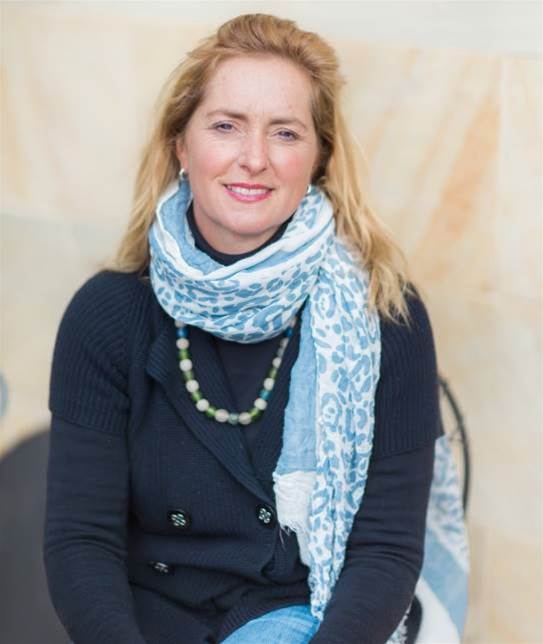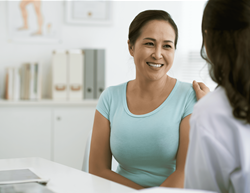Mandy Wales was only 42 with two young children, aged six and 10, when she was diagnosed with aggressive breast cancer in 2015. Thanks to her participation in the Breast Cancer Trials program, she’s currently in the monitoring stage of her treatment. Here, she discusses her journey and gives her advice to other women battling the disease.
"It's confronting for me to talk about my breast cancer experience, but I feel strongly about encouraging routine breast checks and letting women who are going through similar experiences know that they're not alone.
In the lead-up to my diagnosis, I was living a very busy life. I had two young children and was running a cattle business with my husband. I was also towards the end of writing the thesis for my PhD and had just been to Sweden and Denmark to speak at a conference.
One weekend, I developed very sudden pain and redness and swelling in my right breast. I didn’t suspected cancer, I presumed I had some kind of unusual breast abscess or mastitis, which I thought was really weird because I was obviously not breast feeding at that time.
I visited a doctor and she said I should have an ultrasound that day as a precaution. Within seconds the radiologist said, "Look, I just need to check something." She went outside the room and came back with the specialist, who said, "I'm very sorry, but you have cancer."
It was incredibly surreal and unexpected. In those first few days my initial thought was that I'd be fine because had a really common cancer. I reassured myself that it was prioritised in cancer research budget allocations and had a really high survival rate. I didn't realise the gravity of my situation at first.
I was referred to a surgeon and I remember saying to him, "Well, these breasts, I've breast fed my children. They've done their job. They've been fun, but their time has come. Double mastectomy. Whip them off."
I only realised the seriousness of my diagnosis when he said my tumour was so aggressive that it had already spread to the point that it was inoperable.
My diagnosis was a Stage 3C cancer and I had to have chemotherapy first to shrink the tumour. Because my cancer was so aggressive, the normal treatment cycle, where chemo is spaced at least three weeks apart, wasn't an option. The cancer was growing too fast in between. So I had what's called dose dense chemotherapy, where there's no real down time between treatments.
After several months of chemotherapy, my tumour was still 11 centimetres but it was reduced enough that they could operate. I had a mastectomy, followed very quickly by several weeks of radiation.
While I was having radiation my oncology team discussed what the next step should be. Although the cancer hadn't metastasized to any distant organs, it was so aggressive that I was at high risk of recurrence or of it metastasizing. So the team was keen to find some additional treatment after radiation.
We talked about different options, but no-one was aware of any clinical trials that were for people like me who still had early stage cancer but were in a high-risk category.
I did some research of my own, looking at every single clinical trial that was available in Australia and I found some information about the Penelope B trial, which used the drug Palbociclib in combination with anti-hormonal therapy for cancer patients.
I had a conversation with my medical oncologist and he agreed that it was likely that I would meet the criteria. We decided it could be really good treatment option for me, although there was no guarantee I would get the active drug.
I was referred to the clinical trial oncologist and was admitted to the trial. I've since finished the treatment stage and I'm now in the ongoing monitoring stage. I still have six monthly check ups and it appears to have stopped the cancer from spreading further at this stage. It's certainly been a source of hope, in terms of what my prospects are.
Being involved in the clinical trial also means that there's a likelihood that the research that's conducted might lead to new treatment options and that other women in the future might have some more options ahead of them.

Throughout the course of my treatment I met many patients who were quite a bit older than me and they talked about making decisions to retire and travel and change their priorities in life.
I'm at a different life stage, with young children to parent, so I had different decisions to make. My focus was on continuing to cherish my children and my husband and my extended family and my friends. I also want to live my life with purpose - it's not about necessarily having a bucket list that means that I'm ticking off all of the holidays I want to have. It's also about achieving things in life and being part of something bigger than just myself.
The message I want to give to other women fighting breast cancer is to treat your diagnosis and your treatment as just one aspect of your life and not to let it define you, but at the same time to realise that it will impact on your life. And remember to be kind to yourself. I strongly believe that you don't have to be a so called 'cancer warrior'. As much as you may wish to be strong, you're also human and someone experiencing an illness.
It often surprised me, particularly when I was having the more intensive treatment, that there is community expectation that because you have cancer you need to be strong, always have a positive attitude and fight this thing. It seems to be quite different to the kind of reaction you have to other types of illnesses or injuries, where people just want you to get better, and don't necessarily expect you to be the toughest girl on the planet at the same time.
It’s OK to simply do the best you can, and expect that there's going to be difficult times. But, there are also still going to be good times, and normal times, and average times. It's certainly not going to be the focus of everyone's lives every day, and that's OK too. Sadly, until we have enough research to have a cure for all of these different types of cancer, it's just a part of life."
About Breast Cancer Trials
Breast Cancer Trials is AUNZ’s largest oncology research organisation - a group of world-leading breast cancer doctors and researchers based in Australia and New Zealand committed to exploring and finding better treatments for people affected by breast cancer through clinical trials research. To learn more or donate to the program, click here.
Breast cancer symptoms that aren't a lump
While lumps remain the most common breast cancer symptom, they aren't the only one. Rarer signs can be dimpling on the breast; a red, flaky rash on the skin of the breast, areola or nipple; red, swollen, tender breasts; nipple discharge; or nipple retraction.










